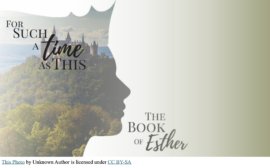By: Michelle Johnson, PhD Candidate | January 1, 2023
Happy New Years! Once again, we find ourselves at the beginning of a new year. January 1st traditionally abounds with resolutions. While I’m not a huge fan of making resolutions–declarations of things I will or won’t do now that the calendar has flipped to a new year only to find they are long forgotten by the end of January, I have begun a new habit that’s worth sharing. I have a growing desire to spend more and more time in God’s word each day. It is a longing to learn about him, hear from him, know him better, and understand how he wants me to live.
I was challenged a couple of months ago by a pastor to read one Psalm every day. So, a little over 40 days ago, I began to read one psalm, every day. The time I spend with God isn’t limited to a singular, daily psalm–I read other passages for any number of reasons, but one psalm daily is the consistent daily habit I am honing right now. What follows is a brief introduction to the Psalms. This is followed by three reasons why I suggest–recognizing there are many more, reading the Psalms this year.
Psalm Basics
Many of us have memorized a handful of the psalms in Sunday School or are familiar with singular verses quoted on cards and plagues hung in our homes. However, to understand the Psalms, there are just a few basics that are helpful to know as you begin.
The book of Psalms is found in the Old Testament, and while it appears to be one book in our Bibles, it is a collection of five books. Book one consists of Psalms 1-41, book two Psalms 42-72, book three is Psalms 73-89, four is 90-106, and book five is 107-150. A psalm is a hymn or poem and needs to be read as such. Fee and Stuart call them “musical poems.”[1] There are different kinds of Psalms: lament, thanksgiving, hymns of praise, salvation-history, celebration and affirmation, wisdom, and songs of trust.[2] Understanding what each of these types was intended for enables us to understand their purpose and meaning correctly.
Lament Psalms
The lament psalms are expressions of crying out to God in times of hurt, difficulty, and disappointment. Fee and Stuart note that most of the psalms are laments.[3] When reading the lament psalms, one might be surprised at some of their content. There is a sub-category of lament psalms called imprecatory psalms.[4] These psalms demonstrate an expression of extreme anger, frustration, and sadness. Psalm 109 is an example. Here the author (most likely David) calls for his enemy’s days to be few (v8), his children to be fatherless (v9), him not to be shown kindness (v12), have his line of descendants to be cut off (v13), his sins remain (v15), and any memory of him be removed (v15b).
We all feel these emotions but often struggle with them because elsewhere, Scripture tells us to love our enemies and don’t desire evil for others. Here in lies the value of the imprecatory psalms. Fee and Stuart summarize this well “through the imprecatory psalms, God invites us to ‘be angry, but sin not.’”[5] When the imprecatory psalms are “understood in their context as part of the language of the laments and used rightly to channel and control our potentially sinful anger, the imprecatory psalms can indeed help us from harboring or displaying anger against others.”[6]
Thanksgiving Psalms
Thanksgiving psalms are just that–hymns that extol gratitude to God for all he has done.
Praise Psalms
Praise psalms testify to the attributes of God.[7] Psalm 23–one of the best-known and beloved psalms–declares, “the Lord is my shepherd.” (Psalm 23:1 CSB) He is a shepherd to provides, protects, leads, renews, and reassures. Within the six verses of this psalm, several attributes of God are confessed.
Salvation-History Psalms
Salvation-history psalms recount how God has acted in the past to save his people. Psalm 78 is one such example.[8] It provides a summary of Israel’s history–the escape from Egypt and journey through the wilderness to the Promised Land through the reign of King David. There are references to God’s promise to Jacob (v5), the Red Sea Crossing (v13), the provision of water from rocks (v15), sustaining manna from heaven (v24), and several references to the Israelites’ frequent rebellion against him (e.g., v17,32,40).
Celebration and Affirmation Psalms
There are celebration and affirmation psalms. Fee and Stuart further divide this into a few sub-categories. Some of these psalms serve to renew or reaffirm the Sinai covenant between God and Israel. Others are royal psalms and enthronement psalms; these focus on the role of the king in Israel’s history. Finally, Songs of Zion are included here. Central to these psalms are Jerusalem and the Temple.[9]
Wisdom Psalms & Psalms of Trust
Rounding out the psalm categories are wisdom psalms and Songs of Trust.[10] Each of these is self-explanatory. God is to be trusted, and wisdom is to be sought.
Three Reasons
While there are many reasons to read the Psalms, I would like to offer three.
Reason #1: Reminder of the Attributes of God
First is the attributes of God. As I have begun to make my way through the Psalms, I am reminded daily of the different aspects of God’s character. I have been reminded that he is holy and worthy of my worship and awe. He is the creator, and everything in creation, including me, is his. God is just and the perfect judge. He is merciful, compassionate, and loving toward me.
Reason #2: Expression of Emotions
The second reason I would suggest reading the Psalms is found in the lament and imprecatory psalms (see above). The psalms give me a place to express my emotions. I can find common ground as the psalmist cries out to God in times of trouble and difficulty. These same psalms put my emotions in perspective as the psalmist expresses trust and confidence in the Lord. I can be assured that God is my refuge and place of rest.
Reason #3: Acknowledge Who We Are, Who God Is, And Our Response to Him
Reading the psalms is giving me the right perspective on who I am, who God is, and how I need to respond to him. Each of the psalms I have read so far has testified to my dependence upon God. I am reliant upon him for everything (provision, protection, salvation, wisdom, etc.), and he is trustworthy and able. A rehearsal of his attributes and past actions on behalf of his people assures me of the solid foundation I find in him. He is the creator, and I am his creation. This reminds me that I am not in charge. My right response toward him is awe, worship, obedience, gratitude, love, and submission. These are just a few of the ways I gain the right perspective from reading the psalms.
Conclusion
Spending time with God by reading any portion of the Bible is time well spent. This has been a very brief look into the Psalms and the value of immersing oneself in their content regularly. If you are a resolution-making person, might I suggest determining to spend time each day with God in the Psalms over the next 150 days? Take some time (check out Fee’s and Stuart’s book) to learn more about the various kinds of psalms and how to rightly read them and enjoy this treasure God has provided for us.
About the Author

Michelle Johnson is a Ph.D. Candidate in the Theology and Apologetics program at Liberty University. She also earned her M.A. in Theological Studies and her M.Div. in Professional Ministries at Liberty University. Michelle graduated from the University of Minnesota with her undergraduate degrees. She and her husband Steve live in Mankato, Minnesota, where she also serves in women’s ministries. In addition to her love of theology and apologetics, Michelle also has a passion for historical studies, particularly the theology of the Patristics. When she is not spending time reading or writing, Michelle can often be found dreaming of her next travel adventure or enjoying a great cup of coffee. Michelle Johnson serves as the Executive Vice-President and Managing Editor of Bellator Christi Ministries.
Notes
Fee, Gordon D., and Douglas K. Stuart. How to Read the Bible for All Its Worth. 3rd ed. Grand Rapids, MI: Zondervan, 2003.
[1] Ibid., 206; 207.
[2] 212-215. What follows is a summary of the seven categories of psalms found in Fee’s and Stuart’s book.
[3] 212.
[4] 220-222. Fee and Stuart offer an excellent commentary on the category of imprecatory psalms, how they should be read and understood in their correct context. They offer present day application for the reader of these challenging passages.
[5] 220.
[6] 221.
[7] 212-213.
[10] 214.
Copyright, 2023. BellatorChristi.com.





